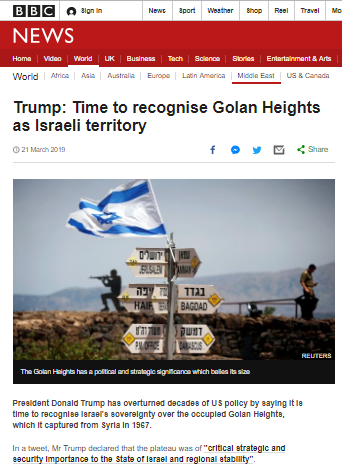On November 2nd the BBC News website published its latest report on the proposed relocation of a foreign embassy to Jerusalem – “Israel’s Netanyahu welcomes Brazil Jerusalem embassy vow“.
“Israeli PM Benjamin Netanyahu has welcomed a decision by Brazil’s president-elect to move its embassy from Tel Aviv to Jerusalem.
Mr Netanyahu praised it as “historic, [and] correct”. Palestinians called the move “provocative and illegal”.
Jair Bolsonaro, a far-right politician, expressed strong support for Israel during his election campaign.
Jerusalem’s status is one of the most contentious issues between Israel and the Palestinians.
Israel considers the whole of Jerusalem as its capital, while the Palestinians seek East Jerusalem as the capital of a hoped-for Palestinian state.”
As was the case in an article published last month, a problematic backgrounder video by Yolande Knell dating from December 2017 was promoted in this latest report. Later on readers found a typical BBC ‘nothing worth mentioning happened before 1967’ portrayal of the story’s background:
“The status of Jerusalem goes to the heart of the Israeli-Palestinian conflict.
Israel regards Jerusalem as its “eternal and undivided” capital, while the Palestinians claim East Jerusalem – occupied by Israel in the 1967 Middle East war – as the capital of a future state.”
Obviously if the BBC’s audiences are to understand why Israel regards united Jerusalem as its capital they would need to be told of the inclusion of the city in the territory assigned by the League of Nations to the creation of a Jewish homeland. They would also need to be informed of the belligerent British-backed Jordanian invasion and subsequent ethnic cleansing of Jews who had lived in Jerusalem for generations from districts including the Old City in 1948, together with the destruction of synagogues and cemeteries, as well as the fact that the 1949 Armistice Agreement between Israel and Jordan specifically stated that the ceasefire lines were not borders.
However, since the BBC began covering stories relating to the relocation of foreign embassies to Jerusalem in late 2016 and particularly since the US announcement concerning its embassy in December 2017, that background information has been serially denied to audiences.
Readers of this report also found the BBC’s usual partisan framing of ‘international law’ and ‘settlements’ with no mention of the fact that some of the Jerusalem neighbourhoods it chooses to define as such were inhabited by Jews until the Jordanian occupation.
“Since 1967, Israel has built a dozen settlements, home to about 200,000 Jews, in East Jerusalem. These are considered illegal under international law, though Israel disputes this.”
While there is nothing new about the BBC’s failure to provide its audiences with the full range of information necessary for their understanding of the background to these stories concerning the relocation of foreign embassies to Jerusalem, the fact that it adopts that editorial policy – committed as it is to “due impartiality” under BBC editorial guidelines and even as it repeatedly tells audiences that “Jerusalem’s status is one of the most contentious issues between Israel and the Palestinians” – is truly remarkable.
Related Articles:
BBC framing of Jerusalem embassy stories continues
Mapping the BBC’s branding of declarations on Jerusalem as ‘controversial’
An overview of BBC News website coverage of the US embassy story
Reviewing the BBC’s presentation of Jerusalem history




